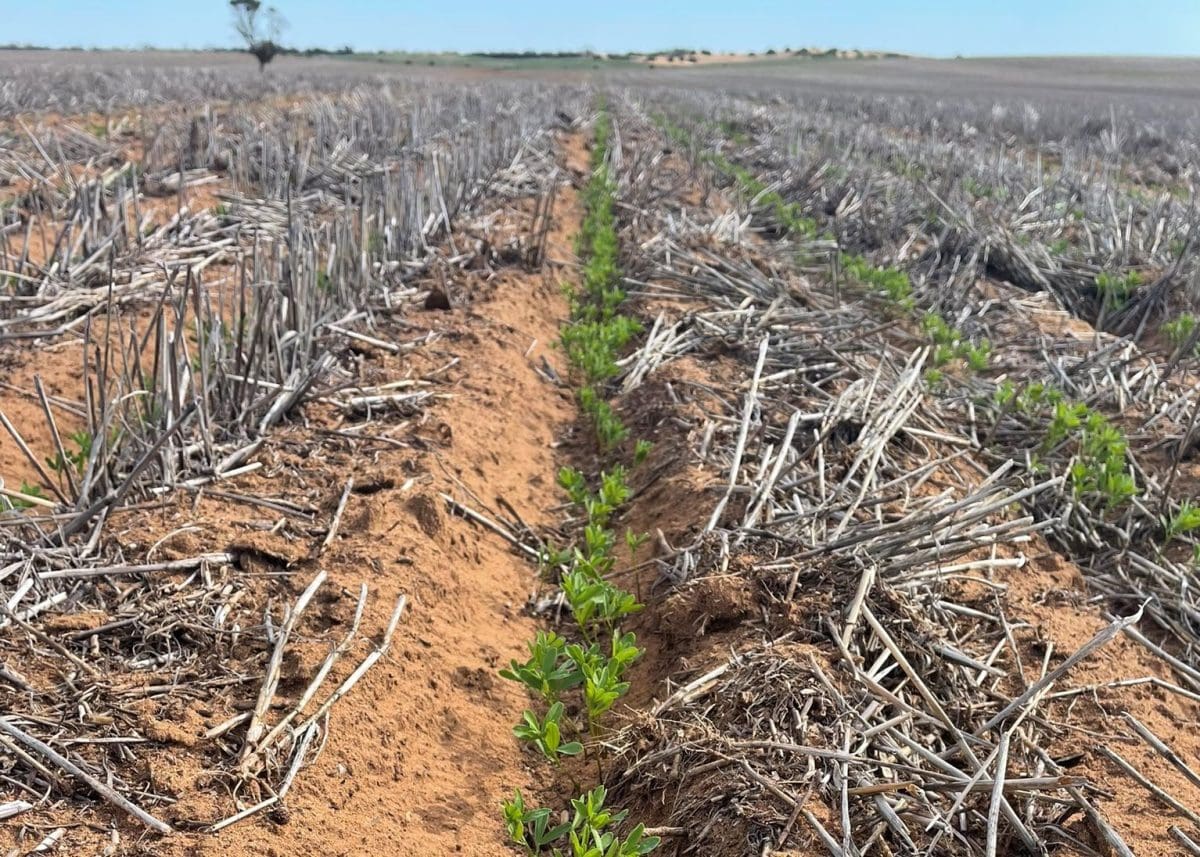
This crop of Hallmark lentils is off to a strong start in the Southern Mallee. Photo: David Schubert, Dodgshun Medlin
GENERAL rain across most of Australia’s pulse-growing regions has seen farmer-to-trade selling slow in the past month.
Export demand for faba beans and lentils remains solid as container sales to anywhere not on the China route continue to be problematic.
Rain across eastern Australia is hampering the mungbean harvest and slowing delivery of new-crop to container packers in northern regions, but is helping to establish winter pulses in all states.
All prices quoted are in Australian dollars per tonne.
Chickpeas
The chickpea market remains in the doldrums ahead of what is expected to be a much-reduced planted area in Queensland and New South Wales in response to the depressed export market.
Traders say export interest in chickpeas is largely confined to Pakistan, where a troubled economy and bleak prospects for container shipments have thwarted the sales outlook.
Weather-affected chickpeas are trading at roughly $350/t delivered northern consumer, primarily for pig and poultry rations.
Sound-quality chickpeas are nominally quoted at around $430/t delivered up-country packer, and traded volumes are negligible.
Growers in Queensland and northern NSW are expected to start planting chickpeas next month, with Central Queensland likely to hold area due to a lack of rotation options, and better price prospects for early-shipped product.
Faba beans
Prices for faba beans have firmed in the past month to around $520/t delivered port, or $470/t delivered up-country packer.
“In the past week, they’re up $25/t; every time there are a couple of hatches in a part vessel to fill, the price goes up,” Melaluka Trading director Mick Fitzgerald said.
Conqueror Milling Company at Cootamundra in southern NSW is a major up-country user of faba beans, and general manager Alistair Pennington said faba beans stored on farm are still coming into site at around $440-$450/t delivered.
“That’s a pretty consistent price, and $490/t keeps popping up into Melbourne, which is $60 for freight and $430 ex farm.”
Mr Pennington said grower interest in planting pulses on the south-slopes is high, partly because pulses can minimise fertiliser expenditure, and also because pulse crops deliver good yields for follow-up crops.
“The best canola and wheat crops came off pulse stubbles last year, so while the weather’s like it is, it’s very conducive to pulses.”
Pulse Australia southern agronomist Phil Bowden said 2022-23 looks like being another big year for fabas.
“I think there are a lot of faba beans going in again on the back of a couple of seasons where people have done well with them, and the thing about faba beans, as opposed to other pulses, is they can yield really well,” Mr Bowden said.
“Even if the price isn’t all that great… people are still going to make good gross margins.”
Trade estimates suggest Australia’s 2021-22 faba bean crop could have yielded around 800,000t, and more than half of that has already been exported to Egypt.
Lentils
Lentil prices have held relatively steady over the past month, with bids at more than $1000/t delivered port when traders are looking to fill export cargoes, and $950/t being paid by up-country packers.
“We got a free kick with the dollar coming off in the past couple of weeks, and that boosted lentil values; it went straight into the bid side,” GeoCommodities broker Brad Knight said.
Australian exporters remain keen sellers of lentils in this period with a zero tariff into India, and solid demand from other markets including Bangladesh and Egypt.
“They want to keep selling more bulk.”
Planting of the lentil crop in Victoria’s Mallee and Wimmera regions, and throughout South Australia, is well under way in mostly favourable conditions, although SA could do with rain soon.
Most Mallee growers have finished planting lentils, and are now winding up their sowing programs with cereals.
Most growers have planted their intended faba bean area in favourable conditions, and are now moving on to planting cereals.
Mungbeans
Wet weather has slowed harvest progress on mungbeans, and trade activity has contracted as growers will not sell until they have product in the bin due to the risk of rain-related downgrading.
However, prices delivered up-country packer remain steady at $1150/t for processing, and $1050/t for manufacturing.
Australian Choice Exports managing director James Hunt said currency fluctuations are affecting counterparties, and trade is slow.
“With the dollar down so much, buying countries are under pressure with their currency, and there’s not much trade going on,” Mr Hunt said.
“Growers are really quiet, and trade’s very quiet.
“Everyone’s waiting to see what this rain will do.”
Grain Central: Get our free news straight to your inbox – Click here

HAVE YOUR SAY